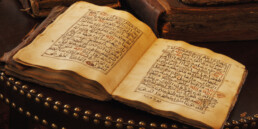Why I do the Ramadan Quran Program
For years I’ve encouraged laymen to read this most enchanting book. Some had simply fallen into acceptable heedlessness and always prioritised other things not getting around to it. They claimed to believe in the Quran but had no idea what it is that they believe because they hadn’t read it.
Many would tell me that they’d read it but not fully understood it. Others who’d been on numerous Quran courses would detail how pedantically they’d broken down the etymology of a word, or the numerous meanings for a phrase, but when I’d ask what the point of the actual verse or passage was I’d get a blank stare. Most would confess that whilst the content of those courses was interesting, they didn’t get much in terms of the bigger picture or that which was deeply action guiding or heart settling.
I asked myself: why do so many sincere people struggle to read it or to get what they’ve read?
Then, what I had been taking for granted dawned on me.
These lovely people don’t have any context for the divine message - where it sits in human history and it’s civilisations.
- They don’t know the events God’s referring to nor their significance.
- They don’t get why God’s talking to Jews and Christians in a ‘Muslim’ book.
- They don’t get what God means by the various terms He employs.
- They don’t get the logic of His ‘signs’.
- They struggle to keep up with the message’s ebbs and flows.
The true religion of God that He speaks of in the Quran is alien because they’re already socialised into thinking about islam in a certain way. And it all holds them back. They’re taught a pre-conceived understanding of what God wants and says, which (mis)shapes their reading, makes it seem disjointed, and lacking coherence. Some understandably give up early on, others struggle their way through - only to end up severely unfulfilled or baffled.
For the majority of Muslims, the Quran quite frankly isn’t compelling or transformative. Most have no idea what God actually says - they believe in the idea of the Quran (as ‘something’ from God) more than taking it as truly functional guidance. It’s not hard to read, it’s actually quite easy. And when you get what God’s actually saying it’s downright addictive - a book you don’t want to put down. You’re in conversation with God.
- Its law isn’t restrictive, it’s liberating.
- Its ideals aren’t pie-in-the-sky, they’re practical.
- Its references aren’t opaque, they’re illuminating.
It provokes the deepest and hardest soul searching you’ve ever done. It’s personal discovery. It’s serious therapy. An emotional rollercoaster: you’ll cry, you’ll laugh. Your crushed ego will feel deeply offended. Your chest will feel lightened with the baggage you shed. Your intellect will expand and your logic will strengthen. You’ll feel silly for things you believed or assumed. You’ll know God is alive and close by. You’ll feel mocked (by virtue of your own silliness) and scorned (for nefarious proclivities), but also feel special, loved and protected. You’ll make sense of your life. You WILL be transformed.
Most importantly, you’ll learn that it’s not calling you to the religion you’ve taken for granted. It goes far beyond ‘religion’ - it calls you to a 5000 year tradition of wholesomeness and something else entirely.
These aren’t big claims, these are literally the testimonies of past attendees. Having personally taken them on this journey has been an absolute honour.
Join The Ramadan Quran Program 2024 going through the transformative process above and living a true Ramadan experience. Make this the year EVERYTHING changed and got to know what it all means.
- Live online (Zoom) 45 mins to 1 hour after Maghrib (GMT)
- Pre-recorded podcasts for summary and context
- 5 days a week, 1-1.5 hour sessions throughout Ramadan
- Recordings available for 2 months post-Ramadan
To check out the Program, please click HERE
Is there ‘barakah’ in the sounds of the Quran?
This article is to clarify where ‘barakah’ actually comes into play when reading the Quran, according to God Himself. To begin with, there are three distinctions I’d like to make:
- Reading mindfully: To read something one understands (semantics) and pay attention to the content (pragmatics).
- Reading without understanding: To read something one understands without paying much attention to the content (semantics but no pragmatics).
- Phonemic practice: To sound out the vowelised Arabic script of the Quran not understanding what is being sounded out (no semantics nor pragmatics).
None of these distinctions are intended to be pejorative: they are merely terms I intend to use so that the points I make here in good faith are clear.
My point in this post (like all others I write on this theme):
It is one of the greatest obligations (wujūb) in the shari’ah to read the Quran mindfully. That means reading the Quran in a language we understand and paying attention to what God said. Bar legitimate impediments, sufficing with phonemic practice is wrong. God puts it plain and simple.
Verse analysis of 2:114
Who could be more wicked than those who prohibit the mention of God’s name in His places of worship and strive to ruin them? Such people should not enter them without fear: there is disgrace for them in this world and painful punishment in the Hereafter.
Qur'an 2:114
Some religious personalities have been using this verse to argue that the temporary suspension of congregational prayers during lockdown is wrong. However, the brief points listed here outline how using this verse for such a conclusion is unsound.
How so?
What's the water under God's throne?
“It is He who created the heavens and the earth in six periods, and His throne extends over the water, so as to test which of you does best…”
Qur'an 11:7
This post explores what God might mean by ‘waters’. As a caveat I’m not suggesting that what I’m about to present is a conclusive interpretation, it’s simply an exploration which is all we can really do with such verses, and I often enjoy intelligent godly theories presented by others. I don’t believe there’s a need to be conclusive with such reports (akhbar) - God did not provide us with the finer details precisely because He wants us to use our intellects and ponder the cosmos in a way that inspires deep reverence and awe, which is relative to the individual since the depth people require is personal.
What prompted these thoughts, as with all scholarly insights I suppose, were initial questions such as does 'water' here refer to the type on earth, like a lake or ocean floating about somewhere out there? Of course, put like this it sounds quite bizarre. One thing we tend to overlook when it comes to things beyond our immediate perceptions is that whilst God uses human representations for things out there (how else would humans understand what was being said?) it does not mean that their absolute reality is as humans understand the representations. Even in this verse, when God uses the term ‘throne’, no sensible person claims that God is sitting (as a human does) on a giant throne made of wood, metal or jewels which is simply floating about somewhere beyond the universe. It’d be somewhat anatopistic, that is, something out of its proper place. But then why would God choose the word throne (or ‘arsh in Arabic)? Well reasonably, because what God is literally talking about is best represented to the average human mind through a word she already recognises.
So hopefully having made that clear, what might the ‘water’ over which the throne sits be? A new experiment, the findings of which were published last week in Nature, confirms the existence of “superionic ice” with Quanta Magazine reporting that ‘Across the solar system, at least, more water probably exists as superionic ice — filling the interiors of Uranus and Neptune — than in any other phase, including the liquid form sloshing in oceans on Earth, Europa and Enceladus…All the previously known water ices are made of intact water molecules, each with one oxygen atom linked to two hydrogens. But superionic ice, the new measurements confirm, isn’t like that. It exists in a sort of surrealist limbo, part solid, part liquid. Individual water molecules break apart. The oxygen atoms form a cubic lattice, but the hydrogen atoms spill free, flowing like a liquid through the rigid cage of oxygens.’ However, ‘Depending on whom you ask, superionic ice is either another addition to water’s already cluttered array of avatars or something even stranger. Because its water molecules break apart, said the physicist Livia Bove of France’s National Center for Scientific Research and Pierre and Marie Curie University, it’s not quite a new phase of water. “It’s really a new state of matter,” she said, “which is rather spectacular.”’ To be clear, I’m not saying the water beneath the throne is superionic ice for sure but I’m exploring (as the sahabah and scholars after them would characteristically do) the idea that it could possibly be a type of superionic ice, but also quite plausibly, a completely new state of matter that we have yet to come across - or even conceive of.
Can we know more, and did the Prophet tell us anything? Well interestingly, al-Bukhari reports that the Prophet began to explain the affairs of the beginning of creation, but it was missed by Imran b. Husayn as he was called away! A delegation from Yemen came to see the Prophet saying, “We come offering peace to the messenger of God, to learn about the faith, and to ask how all of this began?” The Prophet began to explain, “God was present and there was nothing else (of the cosmos) besides Him, and the throne was above the water, and He wrote in the dhikr before everything occurred, then He created the seven heavens.” Imran b. Husayn was then called away to his camel which had run off and resultantly missed the rest of the explanation. He lamented afterwards, “I wish I had left the camel!”
We haven’t much related to us from the Prophet in regards to what the water is, and we don’t know whether he touched upon it whilst Imran b. Husayn was absent. However, it seems the conversation amongst the sahabah didn’t stop there. Sa’eed b. Jubayr relates that the prophetic companion Abdullah b. Abbas was asked in reference to this verse, “and what is the water on?” He replied, “a wind,” which if it was something he was relating from the Prophet (and not his own ijhtihad), might refer to a vast ocean of cosmic charged particles which sits under the ‘water’.
But what’s the purpose of all of this? Here we are called on to ponder the magnitude of God’s creation - we know how colossal the Pacific Ocean is, so imagine a superionic ice that extends for trillions (to the power of trillions, and far far more) lights years! To even begin to contemplate magnitude and reality here is mind-boggling, and it ought to bear on us the insignificance of man and his affairs, or the nature of the power he foolishly thinks he has. It induces a far deeper consideration of the oft-repeated phrase ‘God is great.’
In this way, the possible meaning of the continuing verse “so as to test which of you does best” is that God tells us of the throne and the waters “to try his servants to consider and deduce (values) such as His complete (divine) abilities and the resurrection of the soul” as al-Qurtubi suggests, and then to use the faculties of the intellect as Qatadah put it, to recognise God’s supreme majesty rather than ignoring what such knowledge suggests and living out a life devoid of God. al-Dah’hak opined that “does best” means offers the most appreciation,” ostensibly from considering and deducing such values. The use of the intellect and a show of appreciation to God are two fundamental principles that flow through the Book of God, and sit centrally in the meta-narrative that informs our existential purpose, something I hope to map out gradually for believers seeking a holistic understanding of their relationship and engagement with the Most High.
The Qur’an: Songs, Sounds, or Meanings?
The current status quo has meant that we marvel at those who memorise the Qur'an, and commend its articulation as phonemes. Is this the particular status-quo that God intended, and is it okay to say this is enough?
God said of the Qur’an and revelation:
- ‘This is a blessed Scripture which We sent down to you, for people to think about its messages, and for those with understanding to take heed.’ (Q 38:29)
- ‘This, too, is a blessed Scripture which We have sent down; follow it and be conscious of your Lord, so that you may receive mercy - lest you say, ‘Scriptures were only sent down to two communities before us: we were not aware of what they studied.’ (Q 6:155-156)
- ‘Be devoted to God (rabbani) in that you teach the Scripture and in that you study it.’ (Q 3:79)
There is nothing in the Qur’an that tells us that God seeks the mere articulation of Arabic phonemes, and when we think about it, to treat a message like this in any other context would be quite strange. The assumption that mere recitation or memorisation, whether of ourselves or our children, is a saving grace, is deeply misplaced.
How so?
Ziyad b. Labid said: The Prophet mentioned something and then said, “…that shall be in times when knowledge (in the form of guidance) is gone.” I said: "Messenger of God, how shall (such) knowledge disappear when we recite the Qur'an, and have our children recite, and our children shall have their children recite it until the Day of Judgment?" He said, “Woe to you Ziyad, I considered you the most intelligent man of Madinah! Do not these Jews and Christians recite the Torah and Bible, but know little of what is in it?"
Ibn Majah
So is this not the case with western Muslims? Do we not rejoice at the thought of beautifully sung exotic sounds - believing that being moved by melody is a ‘spiritual’ effect (which in fact can equally go for various genres of music)? The Qur'an points to understanding rather than sounds: ‘Will they not contemplate the Qur'an? Do they have locks on their hearts?’ (Q 47:24)
Due to this misfocus the purpose of revelation is being lost. As the hadith of Ziyad intimates, knowledge (in the form of guidance) remains in the Quran. What type of knowledge? It is popularly assumed it is ‘religious’ knowledge, reserved for the Maulana/Alim types, but this deeply incorrect. God guided the ‘normal’ man through the Quran, in his daily political, social, and economic life, imbuing every step with an ethical and productive trajectory.
There is no ‘Muslim leadership’ without knowledge of what’s in the Qur'an. Leadership isn’t merely to make PR statements or to assume some secular pursuits but to know what God wants and to help guide people to it, to champion it, and to seek to preserve it. We are at liberty to ask: do Muslim leaders represent an ethnic group called ‘Muslims’, or do they represent believers? If it is the latter, then surely they should be those who are most informed in the Qur'an, and on social and political matters. Equally, there is no ‘da'wah’ without knowledge of what’s in the Qur'an, both in method and in objective, otherwise what exactly are we calling to? There is no discussion on social inclusion, integration, or the ‘common good’ without knowledge of what God has said in terms of fundamental objectives. The Qur'an is the basis of everything ‘Islamic’ and without intimate enquiry any ‘Islamic’ or ‘Muslim’ related claim is rendered redundant.
Whilst there exists a culture to have our children memorise the book of God, often to accrue some form of social capital amongst other Muslims, consider this: Imam Malik was asked about seven year old child made to memorise the Qur'an. He said "I don't think that is appropriate." al-Abhari said in explanation: 'Malik disliked it, because if a person memorises it this quickly he cannot properly retain it, knowing the parameters it sets. The path of he who learns the Qur'an is that he studies it, unearthing it's laws and knowing the parameters it sets, according to his ability, and a child in most cases is unable to do this. The Companions would remain with one long surah studying it, uncovering all the ahkam within it.' (Sharh al-Jami', Ibn Abd al-Hakam)
Many overlook the notion of specific Qur'anic guidance on contemporary issues, but only because they do not know how to benefit from the revealed word or extract that guidance, and having been witness to many a charlatan stating generalities or far-fetched interpretations that rail against common-sense, they understandably conclude, often subconsciously, that the guidance of the Qur'an is abstract or non-existent. However, the Qur'an is explicitly relevant to 21st century western issues, in fact, most of it is in plain sight. What we clearly have to do is commit some time to giving this knowledge its due, otherwise we proceed merely with Improvised Religion. The Prophet explicitly warned of the state of Christianity or Judaism - despite ‘reciting’ revelation, they had little guidance because of ignorance concerning what revelation contains, and neglecting to learn how to be informed in their personal, social and political affairs by it, or how to operationalise it. Essentially, it led to great deviations from what God wants.
This is something we all ought to reflect upon, and seek to address, preferably together!
Meaning IS the reason for reading the Qur’an
For quite a while, many scholars and preachers have called for believers to understand the scriptures revealed by God and to engage the divine message, yet the majority of British Muslims do not, opting instead to hastily get through the Qur’an as Arabic phonemes (units of sound), and as many times as possible. It’s absurd, and only the devil could make us believe the situation is both logical and/or acceptable.
To believe pronouncing phonemes suffices is to undermine the entire reason why messengers were sent to mankind, “They were messengers bearing good news and warning so mankind have no excuse before God…” (Q 4:165) We’re told that it’ll be said to the disbelievers at the gates, “Were you not sent your own messengers to recite the revelations of your Lord to you and warn you that you’d meet this day?!” (Q 39:71) Of course, by “recite revelation” the gatekeepers will not mean pronouncing Arabic phonemes, but reading and understanding what God said. Understanding is inherent in all of these verses (and many more) since they wouldn't be valid points otherwise, yet the bizarre status-quo has most of us doing something else and then presenting poor arguments to justify it.
Having discussed this with many people, I've come to see a general pattern of conversation and debate. So to summarise, here is a brief presentation that attempts to provide a holistic understanding towards Qur’an recitation in Q&A form. Please bear in mind that I do not utilise every argument nor every response to possible retorts, it merely concerns itself with the oft-invoked sources and arguments used to justify the ill-informed status quo.
The social practice of Qur'an khatms
Some people have asked about the social practice of ‘Qur'an khatms’, where people gather to finish the Qur'an (usually in an hour or so) and follow it up with a delicious feast.
This practice is more evident in some cultures than others, and much has been said against it and in defence of it, from it being encouraged to being considered a blameworthy innovation (bid’ah). I have no intention to get into the wrangling, and I feel that if we consider it with some common-sense reasoning (as God encourages us to do), we’d come to a reasonable conclusion.
Firstly, let's determine what exactly takes place:
1. Groups of people get together to hum Arabic for ambiguously defined ‘barakah’ (blessings).
2. It is claimed that the entire Qur'an will be read, yet each person simply hums their allotted small portion independently, so nobody actually reads the entire thing.
3. No guidance is taken from the book of guidance, nor is the Qur'an even understood - neither the allotted portion, nor in any holistic sense.
Personally, I find it deeply offensive to treat guidance and a message from God in this way. In any other context, would we take an informative and direction-giving letter sent to us, break it up into arbitrary parts, get a bunch of people to hum those parts to themselves in a language they little understand, and then bizarrely claim: 1. that we’ve read the entire letter, and 2. that the author of the letter not only wanted this but would be ecstatic about the strange thing we’ve just done? I think most of us would say no, and in any setting it would be deemed mockery.
Some will now more generally point to hadiths that discuss blessings of Qur'anic recitation. I hope it's becoming increasingly clearer that all of these narrations are in the context of the Qur'an being understood and such blessings (i.e. benefits) being the result of understanding, contemplation and practical application.
To be clear, I'm not negating reading the Qur'an individually or in a group, and those who sit with me witness the Qur'an's primacy in all things. I want us to do Qur'an more, not less, but certainly not as phonemes. Our homes and religious institutions should be alive with the sound of God’s guidance and deep explorations/contemplations on the divine word.
This is a message to all people, so that they may be warned by it, and know that He is the only God, and so that those who have minds may take heed.
Qur'an 14:52








